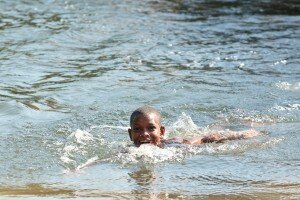If you’re reading this blog post, chances are you’ve used a toilet recently. It’s also likely you’ve never really considered how fortunate you are to have access to that toilet. Could you imagine what it would be like to leave your house in the middle of the night to relieve yourself outside rather than inside the safety and privacy of a clean bathroom stall?
Today is World Toilet Day and we’re recognizing the 2.5 billion people around the world who do not have access to a toilet (that’s about 1/3 of the world’s population!). The magnitude of this problem is significant. Without a toilet, people are forced to defecate outside – an act that compromises a person’s dignity, privacy and safety, and leaves billions susceptible to neglected tropical diseases (NTDs).
Schistosomiasis and intestinal worm infections such as roundworm, hookworm and whipworm are easily spread in communities that do not have access to toilets or sanitation facilities. Schistosomiasis spreads when infected people urinate or defecate close to a water source, contaminating it with the larvae of the parasite. Without proper infrastructure (toilets and city utilities) more than 80% of sewage in developing countries is discharged untreated — polluting rivers, lakes and coastal areas and promoting the spread of NTDs.
Simply walking barefoot around this polluted and contaminated water leaves people exposed to NTDs. As a result, people can be continually re-infected as they work, play, bathe or eat. Children especially have a high risk of contracting these diseases because they often play barefoot outside and put their hands in their mouths without washing them.
According to the World Health Organization, improving water, sanitation and hygiene can reduce trachoma by 27 percent, and improved sanitation could reduce schistosomiasis by as much as 77 percent.
By combining NTD treatment, hygiene education and creative solutions for the 2.5 billion people without access to toilets, we can tackle this problem. Important work is being done by several partner organizations to promote better water, sanitation and hygiene worldwide. The Global Network is also happy to work with former president of Ghana John A. Kufuor to promote long term NTD solutions by integrating mass drug administration with programs for water, sanitation and hygiene – a message the former president drove home at this year’s World Water Week in Stockholm, sweeden.
To learn more about the links between clean water, sanitation and NTDs, watch our quick video .




